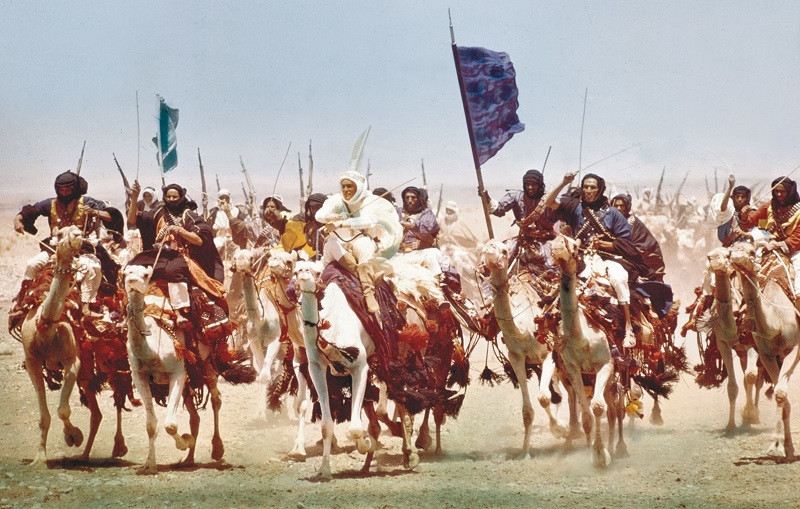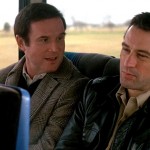
Sometimes we're dumb and haven't seen movies that everyone universally loves. Better Late Than Never is where we make amends by playing catch-up and writing about the experience.
The movie: Lawrence of Arabia (d. David Lean, 1962)
The story: A misfit British Army officer named T.E. Lawrence gets sent to the Middle East during World War I and ends up leading the Arab Revolt against the Turks. Over the course of the film's 17-hour run time (I'll fact-check that later), Lawrence rides a lot of camels, starts to feel more like an Arab than an Englishman, and eventually realizes that, while soldiers can win a war, they don't necessarily get to divide up the spoils afterward.
Why I've never gotten around to watching it: Honestly? Because I suck at watching films that were made before 1970. I know … it's not a good look for someone who regularly writes about movies on the Internet. But I was born in 1974, and most of my early movie obsessions sprung from the new American film movement that started up in the late 1960s but didn't hit critical mass until the 1970s. My film education was Spielberg and Scorsese and Coppola and Romero … and that eventually rolled into Cameron and Zemeckis and Carpenter and Raimi. I had all the movies I needed. Whenever I have ventured into the '60s or earlier it's usually to watch a classic monster movie, a samurai film or something Stanley Kubrick made. I'm trying to do better.
So, now that I've finally seen it, what did I think? The dazzling desert cinematography, soaring score and epic narrative earn Lawrence of Arabia its classic status and make it easy to see how it influenced a generation of filmmakers, including most of those guys whose movies I grew up watching. The one complaint I always hear about this film is its overindulgent length. (Okay, I just looked and the actual run time is three hours and 42 minutes.) Honestly, though, I wasn't bothered by it. Movies telling a story this epic need to breathe. When Lawrence is crossing the desert, the viewer needs to feel the weight of that sun beating down on him, and, unless you're at a 4D screening with a heat lamp pointed at you (note: this is not a suggestion), the best way to convey the misery and hardship of such a journey is by devoting a significant amount of screen time to it.
What was surprising to me was how few battle scenes the movie contains, especially since the psychological cost of war seems to be a primary theme. The DNA of Lawrence of Arabia is present in so many epic war films that have been made over the years — from Michael Mann's The Last of the Mohicans to Mel Gibson's Braveheart — but Lean's movie largely sidesteps the savage battle sequences many of those films are known for. Instead, when Lawrence's army springs a surprise attack on the port town of Aqaba, Lean cuts from an impressive wide shot of the rebel soldiers swooping in straight to the post-battle celebration. Maybe this was a practical decision or indicative of the time it was made. Or maybe Lean made a conscious choice to present Lawrence's psychological deterioration as the result of several smaller, personal moments rather than the war at large. Some of the film's most memorable scenes include Lawrence alone being tortured by the Turks and two separate occurrences where he's forced to murder a friend for the greater good.
Playing Lawrence, the impossibly blue-eyed Peter O'Toole makes for magnetic screen presence. Lawrence's arc is a bit too jagged — he bounces from aloof to broken to carrying a messiah complex without there always being a clear trajectory taking him from one point to the next — but O'Toole mostly sells it, playing Lawrence as a man who repeatedly lets his obsessions get the best of him. The rest of the cast is stellar throughout. Pretty much every scene with Omar Sharif is a standout, and, while it's fine to chuckle at Alec Guinness playing an Arabian Prince, I'm never a fan of criticizing a decades-old film for not adhering to modern-day norms.
Ultimately film is a visual medium, and there's no denying that director Lean and cinematographer Freddie Young were able to capture images that can still drop jaws nearly 50 years later. Today, it's difficult to fathom this film being made without green screens and digital effects, making the practical results Lean was able to achieve all the more impressive. Maybe filmmakers have it too easy now. I swear when you watch a older film that does things that feel like they should have been impossible at the time, you can feel the hard work manifest itself through the movie itself, leading to a more fulfilling viewing experience. Lawrence of Arabia is definitely one of those instances.











